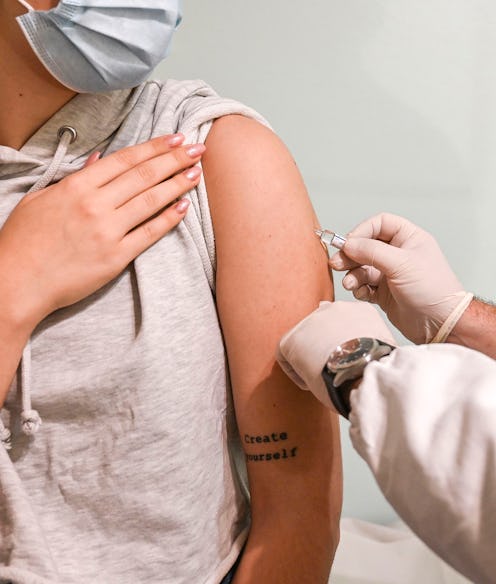Health
Experts Explain Why You Shouldn’t Have To Pay For A COVID Vaccine
The government is (mostly) footing the bill.

It looks like COVID-19 vaccines are landing in the U.S. pretty soon — yay for the possibility of actually hugging people again — and President-elect Joe Biden has promised that after his inauguration on Jan. 20, 2021, all coronavirus vaccines will be free. But while it's possible you could just get the set of two jabs several weeks apart and walk away without spending a penny, how much the COVID-19 vaccine will cost may be more complicated than that in practice.
"I think you'll see a lot of lower costs to no costs depending on who's providing the vaccines," Professor Renée J. Gentry, director of the Vaccine Injury Litigation Clinic at The George Washington University Law School, tells Bustle. Operation Warp Speed, the government organization responsible for funding and distributing vaccines, told The New York Times in September that their aim was that nobody “has to pay a single dime” out of their own pocket for a vaccine. CNN reported in October that the Centers for Medicare and Medicaid Services (CMS) plans to pay for any FDA authorized or approved vaccine itself, while insurers need to pay for getting it administered.
The government can afford to make COVID-19 vaccines free to patients because vaccinations in general are extremely cost effective, Dr. Kathleen Jordan, M.D., SVP of Medical Affairs at medical provider Tia, tells Bustle. "If you save one hospitalization and ICU stay, those dollars pay for tens of thousands of vaccinations," she says. "In comparison to COVID’s social distancing measures, which are far more costly, vaccination is a much more affordable solution."
There could be hidden costs to COVID-19 vaccines, though. When COVID-19 testing was introduced in March, the U.S. government also promised that testing would be free — but in reality, things were a bit more complex, depending on where and how people got tested. The New York Times reported patients getting coronavirus tests at hospitals or health centers and emerging with bills of up to $2,000 — not for the test itself, but for use of the facilities. A test provided at a government testing center could be free, but one done by a private company, at an out-of-network provider, or in the process of treatment for another medical problem could be expensive. So will this be the case with vaccines, too?
Right now, the plan is that it won't. "The cost [of a COVID-19 vaccine] right now is approximately $19 to $25 per dose (for the multi-dose vaccines, approximately $50 per patient)," Professor Gentry says. That's the price pharmaceutical companies are charging governments for each dose. "It's in line with flu shot costs for the uninsured." But, she says, the federal government has committed to offsetting that amount — that is, not passing it on to patients who get vaccinated.
The Financial Times reported in November that most commercial insurers and self-funded employer health plans will be required to provide COVID-19 vaccines without any additional costs, because of rules instituted by the Departments of Labor and Treasury. And if you're on Medicare, the CMS is preparing a plan that makes vaccines free for all Medicare and Medicaid programs across the U.S. "Congress made it very clear that they wanted Medicare beneficiaries to have access to the COVID vaccine at no cost," head of CMS Seema Verma told NPR in October.
If you're uninsured, you should be able to get the vaccine for free, too. As of Nov. 24, the CDC says that the vaccine itself will be free, but that vaccination providers will be able to charge an administration fee to the government. You shouldn't have to chip in. "Vaccine providers can get this fee reimbursed by the patient’s public or private insurance company or, for uninsured patients, by the Health Resources and Services Administration’s Provider Relief Fund," the CDC says.
Getting a vaccine "shouldn't be cost prohibitive," Professor Gentry says. The more people have access, the sooner the pandemic can be history.
Experts:
Dr. Kathleen Jordan M.D.
Professor Renée J. Gentry